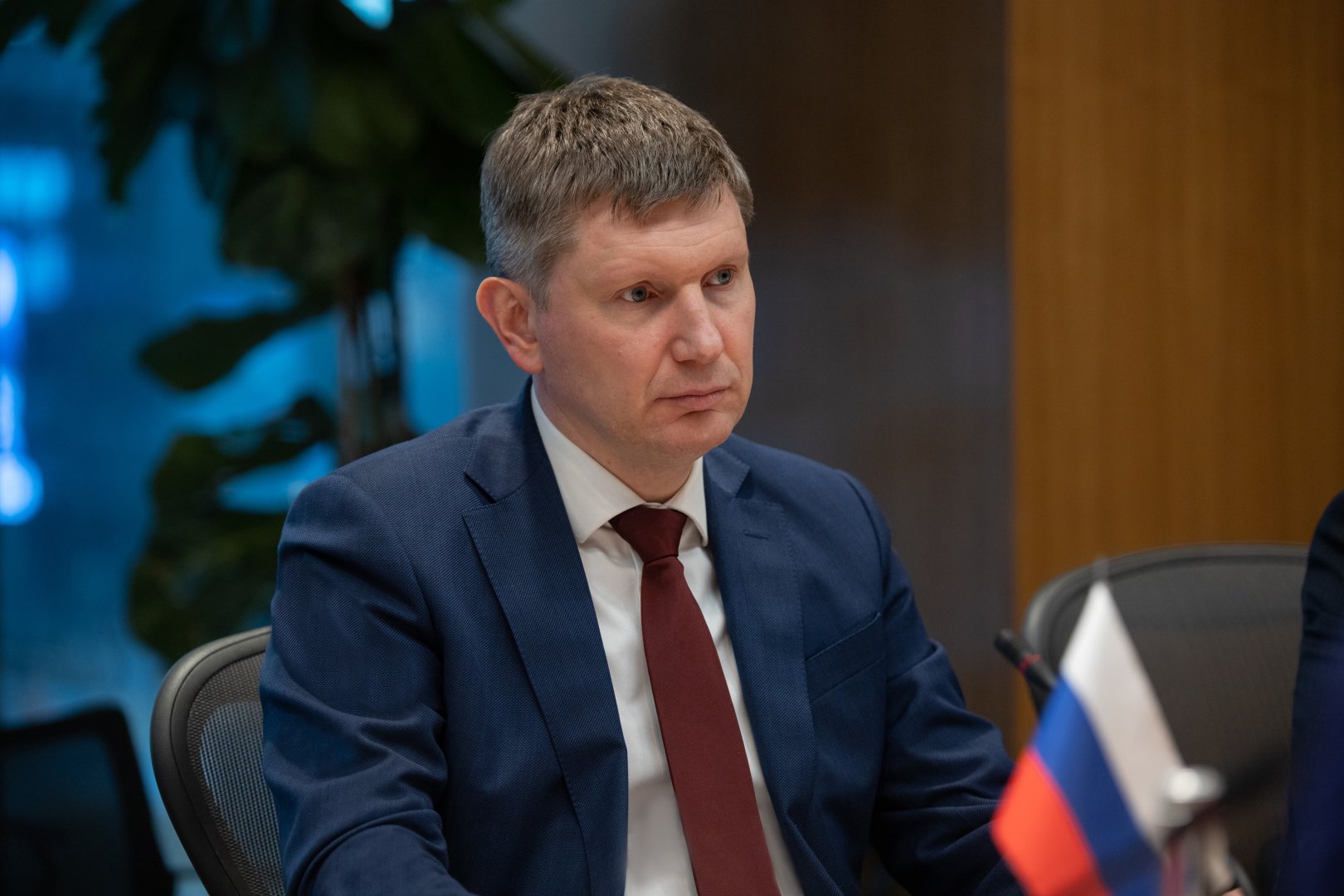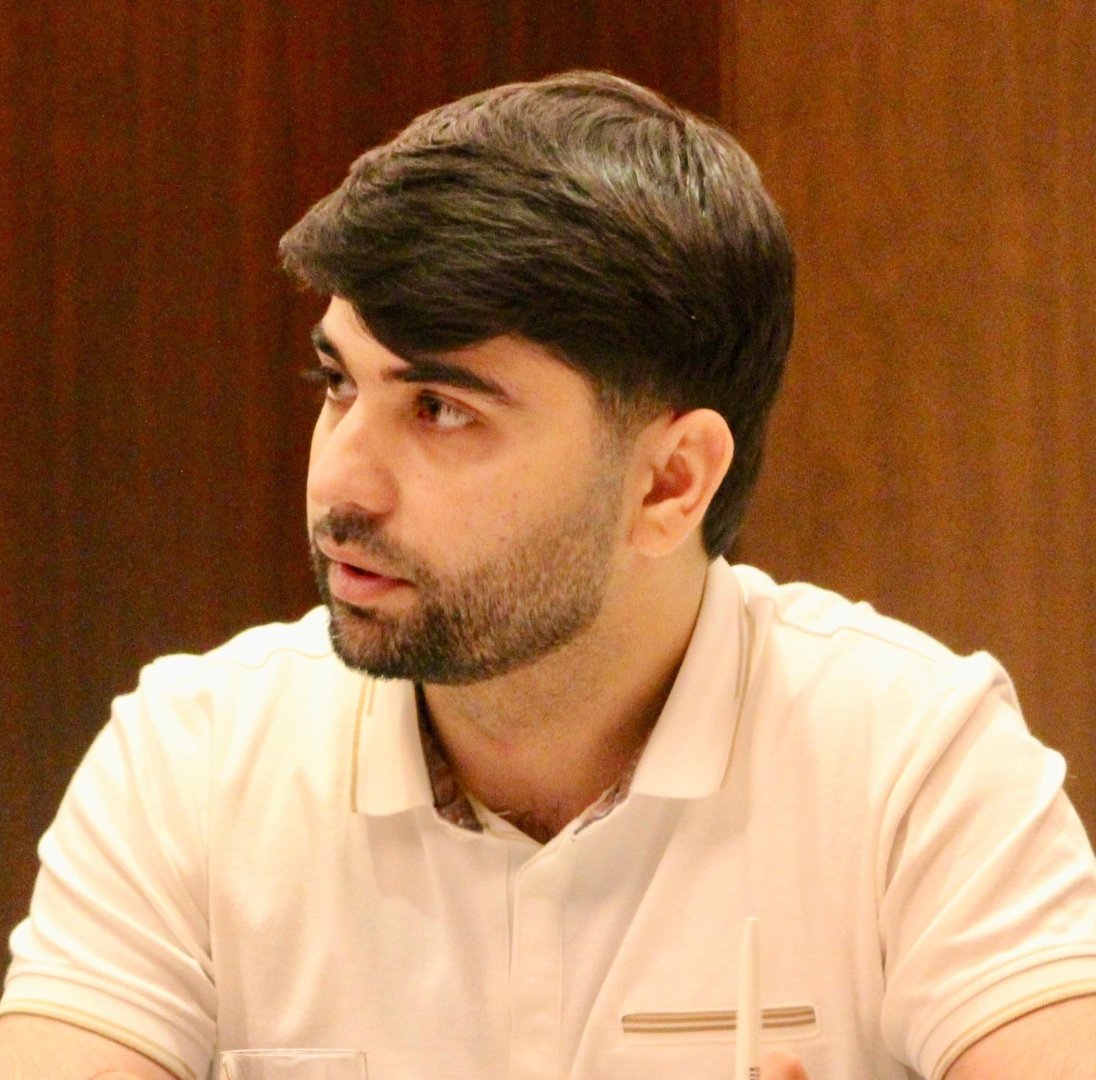BAKU, Azerbaijan, November 14. As part of COP29 in Baku, Trend News Agency proudly presents COP for Hope, a special project offering an unparalleled platform to hear from world leaders and trailblazers in politics, economics, science, and ecology, all united by a shared commitment to addressing today’s pressing climate challenges.
Today, we are honored to speak with Maxim Reshetnikov, the Minister of Economic Development of the Russian Federation.
In an exclusive interview with Trend on the sidelines of COP29, Reshetnikov expressed confidence that Azerbaijan will give fresh momentum to global climate policy.
"We are confident that Azerbaijan will provide fresh momentum to advancing the full spectrum of climate policy measures. Our countries must show that hydrocarbon-exporting nations are not only committed to but are actively implementing the principles of a fair transition to a low-carbon economy while also taking a responsible and proactive approach to the green agenda," he said.
Key issues for Russia at COP29
Reshetnikov also outlined Russia's focus at COP29, emphasizing the importance of international cooperation to address global climate challenges. He highlighted the need for free access to financing and technology to support the transition in developing countries.
"We will be discussing a new collective goal for financing developing countries, as their support is essential to achieving global climate targets. Russia advocates for maintaining the current approach under the UNFCCC regarding the financial obligations of developed countries toward developing nations.
The focus will remain on emission reduction and the future role of fossil fuels. Last year, we successfully highlighted the critical role of transition fuels, particularly natural gas, in the low-carbon transformation of various sectors. In Baku, we aim to further advance the recognition of natural gas as a key enabler for decarbonization efforts," he said.
Reshetnikov added that it is also crucial to establish a new set of rules for the international trading of carbon credits.
"We aim to advance our approaches to inventorying emissions and removals, which played a key role in the comprehensive update of Russia’s greenhouse gas inventory. These methods focus on accurately accounting for the contribution of managed ecosystems to the greenhouse gas balance, as well as the national specifics of technologies used across various sectors of the Russian economy.
The new methodology for the national inventory represents one of the first major outcomes of the Russian Climate Monitoring System project, initiated by the President of the Russian Federation. Since 2022, the Ministry of Economic Development, in collaboration with Roshydromet, the Ministry of Natural Resources, the Ministry of Energy, and over 50 leading scientific institutes, has been implementing this important project," the minister said.
Financing for developing countries
The minister stressed the importance of transitional financing for sectors with high emission levels or where emission reductions are particularly challenging.
"Strict restrictions on fossil fuel support and the refusal to finance such projects will undermine the achievement of the Sustainable Development Goals (SDGs) and jeopardize the energy security of countries. Any unilateral barriers or restrictions disguised under the climate agenda are unacceptable. We believe it is essential to establish practical mechanisms for the effective implementation of international climate agreements. A central issue in this regard is the creation, under Article 6 of the Paris Agreement, of a robust global system for trading carbon units, including through bilateral cooperation mechanisms.
The introduction of carbon units under Article 6 will be a crucial step in recognizing the quality of climate projects, attracting investment, and enabling the sale of carbon units on the international market," he said.
The minister also highlighted that ahead of COP29, Azerbaijan proposed the creation of a Climate Finance Action Fund, aimed at investing in climate change mitigation efforts in developing countries, with its headquarters based in Baku.
"The fund is intended to bring together oil-producing countries and companies that are committed to diversifying their investments toward green initiatives and are ready to support low-carbon development. Expert consultations have just begun, and we are still finalizing the key operational parameters of the fund. We will actively participate in these discussions as well," the minister said.
Russia's Commitment to Sustainable Development
Reshetnikov also emphasized Russia's long-term commitment to a low-carbon economy.
"Decarbonization directly impacts the competitiveness of companies, and businesses are increasingly recognizing this reality. As a result, working within the framework of the climate agenda has become one of the most critical factors driving the development of the global economy. Look at the BRICS nations, the countries of the Persian Gulf, and the Asia-Pacific region—all are actively engaging with the climate agenda.
The Climate Summit is a unique platform that annually brings together thousands of representatives from the public sector, business, and the scientific community. The decisions made at the conference not only set global trends but also serve as benchmarks for the actions countries take in climate policy. At the same time, these decisions allow each country to choose the tools and strategies that best align with its national interests.
This year, the focus of the conference is financial. The scope of assistance, funding sources, and climate finance definition will be discussed in detail. The allocation of financial flows to specific projects is a crucial issue. Reaching an agreement on a "global taxonomy of green projects" will undoubtedly shape the future of the climate agenda. In this context, it is essential that we address transition financing for industries with high emissions or those where reducing emissions is particularly challenging," Reshetnikov said.
Russia's Role in Supporting the Global Transition to Clean Energy
The minister emphasized that national scientific expertise should play a central role in providing technical support for climate negotiations and decision-making at the global level.
"In addition, national studies can significantly enrich and clarify global climate data.
The scientific community presented Russia's national project, the Russian Climate Monitoring System, at the Russian pavilion on November 12. We are eager to collaborate and share our experience in utilizing this system for preparing national reports, including inventories of emissions and carbon sequestration. The results of this project play a crucial role in identifying effective solutions for decarbonization and adaptation while also helping to structure the energy sector and the broader economy more effectively.
Another pressing issue is the conservation of water resources. Our countries are witnessing a decline in the Caspian Sea’s water level due to climate change. To address this, we propose establishing a platform for the exchange of scientific and technical expertise. Additionally, we are prepared to share the results of our monitoring and modeling studies on the ecosystems of the Caspian Sea and the Samur River. Furthermore, we are committed to training Azerbaijani specialists to support efforts in building a national inventory of greenhouse gas emissions and carbon sequestration," he said.
Russian-Azerbaijani Economic Cooperation
The minister emphasized that Azerbaijan is a key strategic partner for Russia.
"This partnership is formalized in the Declaration on Allied Cooperation, signed by the heads of state of Russia and Azerbaijan in 2022, and reflected in ongoing efforts to enhance stability and security on both global and regional levels.
In early 2024, a roadmap was approved outlining key areas of cooperation for the next three years. These include strengthening the North-South International Transport Corridor, increasing the number of joint projects, boosting food supplies, and expanding collaboration in the social, humanitarian, and tourism sectors.
Trade and economic ties between the two nations remain strong, with Russia ranking as one of Azerbaijan's top three trading partners. Bilateral trade continues to show positive dynamics, with trade turnover increasing by 8.5 percent during the first eight months of 2024," he said.
He noted that Russian exports grew by nearly 10 percent, driven by supplies of oil and oil products, foodstuffs, and agricultural raw materials (such as cereals, fats and oils, cocoa, and confectionery); metals (including ferrous metals and aluminum); plastics; as well as electrical machinery and equipment.
"I would also like to highlight a 5.5 percent increase in our imports from Azerbaijan. We have seen a rise in the volumes of vegetables, eggs, dairy products, both alcoholic and non-alcoholic beverages, animal and vegetable oils, plastics, chemical products, and electrical household appliances, as well as ships and boats imported from Azerbaijan.
By the end of the year, we expect mutual trade to grow by at least 10 percent. Investment projects are further strengthening our trade and economic cooperation. Nearly 1,300 enterprises with Russian capital have been established in Azerbaijan.
AvtoVAZ has initiated production in the automotive sector, producing over 1,000 cars this year. Additionally, AvtoVAZ has assembled 179 GAZ Group vehicles, and the KAMAZ service center is now operational. The pharmaceutical industry is producing a diabetes treatment drug and expects to manufacture the first batch of insulin soon. All of these developments are part of the ongoing economic cooperation between Russia and Azerbaijan," the minister said.
Reshetnikov highlighted the opening of a joint transport and logistics center in Dagestan this past August. He also underscored one of the most significant milestones of 2024: the signing of a contract for the supply of cars to the Baku Metro.
"Looking ahead, we plan to deepen cooperation in the industrial sector. Next year, we aim to launch a plant for aluminum and steel composite panels, and discussions are already underway to establish production of chemical products at the Sumgait Chemical Industrial Park," he said.
The minister pointed out that this year, Russia and Azerbaijan have made significant progress in advancing their cooperation on climate change.
"We have finalized the Memorandum of Understanding on Climate Change and Low Carbon Development," the minister noted. "As a reminder, the memorandum was signed during the visit of Russian President Vladimir Putin to Azerbaijan on August 19, 2024. This document establishes the framework for joint climate projects and the exchange of expertise on climate change adaptation. We are eager to begin bilateral consultations as soon as possible, so we can move swiftly into the practical implementation of the memorandum’s provisions," the minister concluded.







